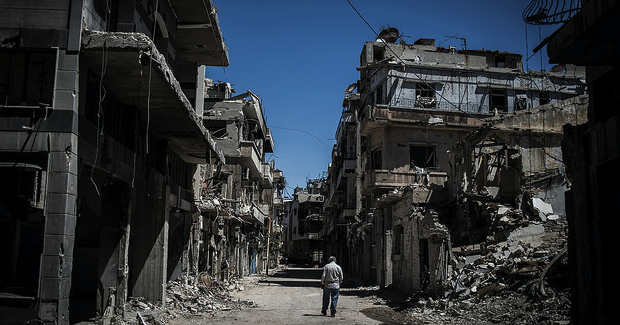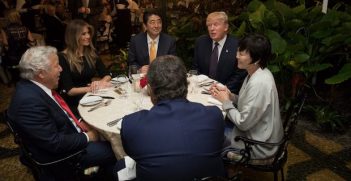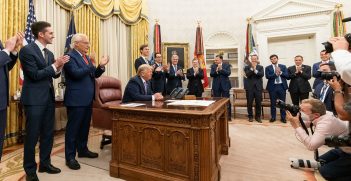Syria: A Changing Balance of Power

The Syrian catastrophe staggers on from outrage to outrage reaching, as the United Nations Secretary-General Ban Ki- moon recently observed, a “new level of depravity” with the attack on a UN aid convoy in northern Syria. Refugee flows continue with significant repercussions beyond the region. And, of course, the killing goes on.
For a while, it looked like the United States and Russia had accepted the unacceptability of the situation and were working cooperatively to break the habit of violence that has engulfed the various groups fighting in the country. The ceasefire that the two countries were working on was always going to be fragile with many groups determined to prevent its success. However, until the US attack on Syrian troops and now the aid convoy attack, Moscow and Washington appeared determined to make the arrangement hold. The prospects for continued cooperation have been seriously set back but, despite the mutual recriminations, it is to be hoped that the negotiations will continue.
The challenges are, however, awesome and made more complex by the changing regional dynamics following the Iran nuclear deal but, more immediately, by the emergence of Russia as the dominant power in the region. In the early days of the Syrian war, the US might have been able to push through an end to the fighting on its own terms. Initiatives, such as that developed by former UN Secretary-General, Kofi Annan, might have succeeded had Washington given him genuine support. Annan said as much when he announced his resignation as the UN Secretary-General’s Special Representative for Syria, complaining of the “destructive competition” between the permanent members of the UN Security Council.
US Secretary of State, John Kerry, has been working under very different circumstances since Russia began to play an active and direct role in the conflict. First, Russia mediated the dispute over Syrian chemical weapons in 2013; but most dramatic was the engagement of the Russian air force just as the Assad regime was looking like it might fall. From that point on, Russian involvement has been decisive. It has helped restore the regime’s authority in much of the country and has relegated the US to a secondary role in the conflict. The US remains largely focused on Islamic State and the bulk of that action is in Iraq, where the campaign to roll the organisation back is in trouble.
The result of these developments is that moves to end the fighting will increasingly be on Russian terms. The current ceasefire plan is largely a Russian-driven process. It is of note that one of the aspects of the agreement involves an element of cooperation and coordination with the government in Damascus. That does not go so far as to imply US reconciliation with the Assad regime but it does suggest a step back from the long-held and unhelpful US insistence that Bashar Al-Assad must be removed from power before a negotiated settlement can be achieved.
The US position has been weakened by a number of factors, including President Obama’s reluctance to become deeply involved in the conflict, the US focus on Islamic State and a crisis in relations between its allies in the Syrian conflict.
Turkey’s intrusion into the war has introduced a new set of concerns for Washington. Ankara has ostensibly set itself the goal of removing Islamic State from the border area following a series of attacks inside Turkey. It has been reasonably successful in this goal but, given the regime’s complicity in Islamic State activities in Iraq and Syria, a degree of scepticism about their dedication to the defeat of ISIS is warranted.
The Turks have also set themselves the goal of blocking the Syrian Kurds from establishing a contiguous area of control along the Syrian-Turkish border. While the US does not support the establishment of an autonomous Kurdish zone along that border, its main ally in the fight against Islamic State in Syria has been the Kurdish People’s Protection Units (YPG), which have ties to the Kurdish People’s Party, a group regarded as a terrorist organisation by a number of countries, including Turkey and the US. The US is, as a result, conflicted in how to deal with these two important allies. How does it mollify President Erdogan while maintaining its support for the YPG in the fight against Islamic State?
Further complicating the US tactics in Syria is the nature of the opposition. Washington likes to see the conflict as a struggle between bad extremist groups like Islamic State and the Al-Nusra front (now re-badged as Jabhat Fateh al-Sham or Front for the Conquest of Syria/the Levant) on one hand and the good secular opposition on the other. The extremist groups must never be part of the negotiating process and have formed the main focus of the planned cooperation between the US and Russia.
A problem for the US is that the Syrian opposition does not see the conflict in such black and white terms. For many of the opposition, the most effective fighters against the Assad regime are those unacceptable extremists. This was evident recently when ‘secular’ groups combined under the leadership of Jabhat Fateh al-Sham to break, temporarily, the government’s encirclement of Aleppo.
We will probably never know who was responsible for the bombing of the aid convoy or why it was conducted. Despite US accusations, it does not seem consistent with Russian interests to threaten the arrangement with the US in this way. It may have been one of those tragic mistakes that plague warfare, like the US bombing of Syrian soldiers or its attack on Afghan police, both in the last few days.
A danger is that these developments have strengthened hardliners, especially in the Syrian government, who believe the regime is winning, who doubt US claims that the attack on Syrian troops was an accident and who want to continue the fight for maximum gain.
Wherever the fault lies, the onus is on the US and Russia to work to revive their plan and to press on despite persistent attempts to derail a settlement.
Dr Anthony Billingsley is a lecturer of international relations at the School of Social Sciences, Faculty of Arts and Social Sciences, at the University of New South Wales. His main research focus is the Middle East and international law.
This article is published under a Creative Commons Licence and may be republished with attribution.





